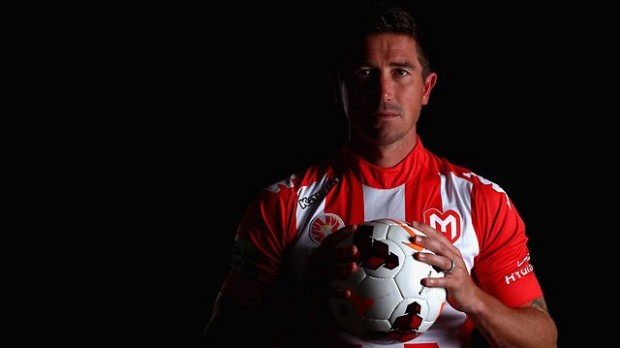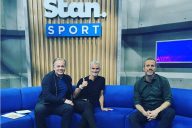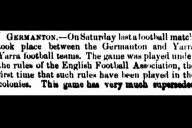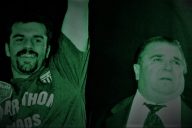While Harry Kewell’s time with the Melbourne Victory boiled down to little more than exhausting pre-signing antics and infrequent bouts of brilliance, his last hurrah with the Melbourne Heart may define his image Down Under. Luke Dodemaide writes.
It is impossible to look at Harry Kewell, who stands at the centre of a pitch in the marine town of Mandurah, Western Australia, without feeling something. This is a long way from his heady days of European glitz and glamour, top-flight competition and pay cheques with more zeros on them than Petr Cech’s goalsheet. But if you extrapolate the criticism, which has been coming thick and fast for a player who is now known to ply his trade (playing a pre-season friendly with his new club Melbourne Heart) in towns like Mandurah, the 35-year-old is lucky just to be here.
Kewell has been banished to obscurity by battle-tested pundits, his ever-reliable gig at Politix, Al Gharafa in the Qatari League, and national coach Holger Osieck. And all of that, mind you, is just in the last year. He is seen to be a heartless mercenary. An injury-prone prima donna. An opportunist whose first foray into the A-League began with a bang and ended with a whimper, complicated by family reasons and footnoted by an unscheduled visit to EPL club Stoke City.
However, all this aside, he is still widely regarded as the greatest Australian football player in history. English Premier League credentials run deep, including I-don’t-care-how-you-earn-it European Champions League and UEFA Super Cup titles with Liverpool. Kewell’s time with Leeds United, before that, is widely accepted as being his masterpiece period.
For his country, he provided the deft miskick that saw Marco Bresciano level the tie with Uruguay in 2005, converted his penalty that helped set John Aloisi up for the winner in the shootout, and scored the crucial — and final — goal of Australia’s 2006 World Cup campaign in Germany, a sizzling volley to tie up the game against Croatia and see the Socceroos through to the ill-fated meeting with Italy.
Kewell, 18, fresh-faced and ambitious, was at the MCG in 1997 when Peter Hore and Iran defaced Australia’s World Cup procession in a manner that made Games of Thrones’ ‘Red Wedding’ finale look like an episode of Matlock. Kewell has been there, and through it, for Australia. And now, he is here — complete with designer stubble, crows-feet wrinkles and a seen-it-all demeanour — in Mandurah, playing for the Melbourne Heart. Wearing the captain’s armband on minimum wage. Arguing the points with the Perth Glory’s Jacob Burns, as fiery as ever despite the game’s ‘friendly’ status. In the 84th minute, he scored in a typical fashion, finishing a Mate Dugandzic free kick that so often go wanting at the Melbourne Heart, bereft of the requisite class to capitalise.
Firing line be damned, Kewell is providing a shot-in-the-arm to a franchise that threatened to go the way of Gold Coast United and the North Queensland Fury. His greatest hope? To play his way into Osieck’s stuttering Socceroos side. You can say he has ‘enough money anyway’ and he may, and you may be right. But you don’t see Lucas Neill doing this. Neither Bresciano. Nor any of the so-called ‘golden generation’ of which Kewell was seen as the petulant, gifted son, least likely to give back. Now, one of the central narratives in the A-League’s decade-long history is weaved around him.
At best, the Sydney-bred veteran wants to become to the Melbourne Victory and Melbourne Heart rivalry what Babe Ruth was to the New York Yankees and Boston Red Sox. The tide-turning tipping point that created two great teams where there was otherwise only one: a discarded champion who rose again at a second home, fulfilling first-time promise. At worst, this will be his ill-fated swan song. George Best, with a 40-inch waist, in the Hong Kong Rangers’ baby blue.
Perhaps Kewell has become a victim of the David Beckham effect, fandom fatigue that sees a player universally regarded as so ridiculously overrated that he becomes irreversibly underrated — to the point where a fair trial becomes all but unfeasible. Almost a contradiction by definition. However, in this trial match, Kewell looks the goods. The season, though, will not be played in Mandurah. Back in Melbourne, Kewell’s lasting Australian legacy will be forged.
















